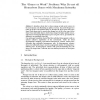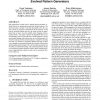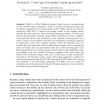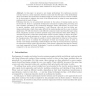13043 search results - page 2555 / 2609 » Simulation of the research process |
CEEMAS
2005
Springer
14 years 1 months ago
2005
Springer
A honeybee colony has to choose among several nectar sources in the environment, each fluctuating in quality over time. Successful forager bees return to the hive and perform dance...
GECCO
2005
Springer
14 years 1 months ago
2005
Springer
Self-organization of brain areas in animals begins prenatally, evidently driven by spontaneously generated internal patterns. The neural structures continue to develop postnatally...
GECCO
2005
Springer
14 years 1 months ago
2005
Springer
Mapping biology into computation has both a domain specific aspect – biological theory – and a methodological aspect – model development. Computational modelers have implici...
HPCC
2005
Springer
14 years 1 months ago
2005
Springer
S-MAC is a MAC (Medium Access Control) protocol as specialized for the wireless sensor network in order to sacrifice transmission delay and extend the working life of the whole sen...
HYBRID
2005
Springer
14 years 1 months ago
2005
Springer
In this paper, we present a new design methodology for synchronous reactive systems, based on a clear separation between control and data flow parts. This methodology allows to fa...




